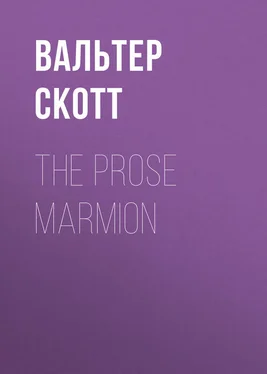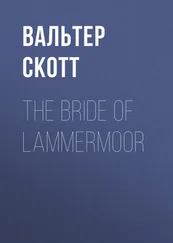Вальтер Скотт - The Prose Marmion
Здесь есть возможность читать онлайн «Вальтер Скотт - The Prose Marmion» — ознакомительный отрывок электронной книги совершенно бесплатно, а после прочтения отрывка купить полную версию. В некоторых случаях можно слушать аудио, скачать через торрент в формате fb2 и присутствует краткое содержание. Жанр: foreign_antique, foreign_prose, на английском языке. Описание произведения, (предисловие) а так же отзывы посетителей доступны на портале библиотеки ЛибКат.
- Название:The Prose Marmion
- Автор:
- Жанр:
- Год:неизвестен
- ISBN:нет данных
- Рейтинг книги:5 / 5. Голосов: 1
-
Избранное:Добавить в избранное
- Отзывы:
-
Ваша оценка:
- 100
- 1
- 2
- 3
- 4
- 5
The Prose Marmion: краткое содержание, описание и аннотация
Предлагаем к чтению аннотацию, описание, краткое содержание или предисловие (зависит от того, что написал сам автор книги «The Prose Marmion»). Если вы не нашли необходимую информацию о книге — напишите в комментариях, мы постараемся отыскать её.
The Prose Marmion — читать онлайн ознакомительный отрывок
Ниже представлен текст книги, разбитый по страницам. Система сохранения места последней прочитанной страницы, позволяет с удобством читать онлайн бесплатно книгу «The Prose Marmion», без необходимости каждый раз заново искать на чём Вы остановились. Поставьте закладку, и сможете в любой момент перейти на страницу, на которой закончили чтение.
Интервал:
Закладка:
Danger, travel, want, and woe soon change the form. Deadly fear can outstrip time; toil quenches the fire of youth; and despair traces wrinkles deeper than old age.
"Happy whom none of these befall;
But this poor Palmer knew them all."
Lord Marmion made known his request, and the Palmer took upon himself the task of guide, on condition that they set out without delay, saying:
"'But I have solemn vows to pay
And may not linger by the way;
Saint Mary grant that cave or spring
May back to peace my bosom bring,
Or bid it throb no more!'"
Then the page, on bended knee, presented to each guest in turn the massive silver bowl of wassail, "the midnight draught of sleep," rich with wine and spices. Lord Marmion drank, "Sound sleep to all"; the earl pledged his noble guest; all drained it merrily except the Palmer. He alone refused, although Selby urged him most courteously. The feast was over, the sound of minstrel hushed. Nought was heard in the castle but the slow footsteps of the guard.
At dawn the chapel doors unclosed, and after a hasty mass from Friar John, a rich repast was served to knight and squire.
"Lord Marmion's bugles blew to horse:
Then came the stirrup-cup in course;
Between the Baron and his host
No point of courtesy was lost;
Till, filing from the gate, had passed
That noble train, their Lord the last.
Then loudly rang the trumpet call;
Thundered the cannon from the wall,
And shook the Scottish shore;
Around the castle eddied slow,
Volumes of smoke as white as snow,
And hid its turrets hoar;
Till they rolled forth upon the air,
And met the river breezes there."
CHAPTER II
The breeze which swept away the rolling smoke from Norham, curled not the Tweed alone. Far upon Northumbrian waters, it blew fresh and strong, bearing on its wings a barque from the Abbey of Whitby on the coast of Yorkshire, sailing to St. Cuthbert's at Lindisfarne, on Holy Isle.
"The merry seamen laugh'd to see
Their gallant ship so lustily
Furrow the green sea-foam.
Much joy'd they in their honor'd freight;
For, on the deck, in chair of state,
The Abbess of Saint Hilda placed,
With five fair nuns, the galley graced.
"'T was sweet to see these holy maids,
Like birds escaped to green-wood shades,
Their first flight from the cage;
How timid, and how curious, too,
For all to them was strange and new,
And all the common sights they view,
Their wonderment engage."
Light-hearted were they all, except the Abbess and the novice Clare. Fair, kind, and noble, the Abbess had early taken the veil. Her hopes, her fears, her joys, were bounded by the cloister walls; her highest ambition being to raise St. Hilda's fame. For this she gave her ample fortune – to build its bowers, to adorn its chapels with rare and quaint carvings, and to deck the relic shrine with ivory and costly gems. The poor and the pilgrim blessed her bounty and shelter.
Her pale cheek and spare form were made more striking by the black Benedictine garb. Vigils and penitence had dimmed the luster of her eyes. Though proud of her religious sway and its severity, she loved her maidens and was loved by them in return.
The purpose of the present voyage was most unhappy, and to the Abbess most painful. She came to Lindisfarne upon the summons of St. Cuthbert's Abbot, to hold with him and the Prioress of Tynemouth an inquisition on two apostates from the faith, if need were, to condemn them to death.
On the galley's prow sat the unhappy sister Clare, young and beautiful, lovely and guileless, as yet a nun unprofessed. She had been betrothed to Ralph de Wilton, whom she supposed now dead, or worse, a dishonored fugitive. After the disgrace brought upon her lover, Clare had been commanded by her guardians to give her hand to Lord Marmion, who loved her for her lands alone. Heartbroken at the fate of her true-love, and to escape this hateful marriage, she was about to take the vestal vow, and in the gloom of St. Hilda hide her blasted hopes, her youth and beauty.
As the vessel glided over the waters, she gazed into their depths, seeing only a sun-scorched desert, waste and bare, where no wave murmured, no breeze sighed. Again she saw a loved form on the burning sands: the dear dead, denied even the simplest rites of burial.
Now the vessel skirted the coast of mountainous Northumberland. Towns, towers, and halls, successive rose before the delighted group of maidens. Tynemouth's Priory appeared, and as they passed, the fair nuns told their beads. At length the Holy Island was reached. The tide was at its flood. Twice each day, pilgrims dry-shod might find their way to the island; and twice each day the waves beat high between the island and the shore, effacing all marks of pilgrim's staff and sandalled foot.
As the galley flew to the port, higher and higher, the castle and its battled towers rose to view, a huge, solemn, dark-red pile. In Saxon strength the massive arches broad and round, row on row, supported by short, ponderous columns, frowned upon the approaching visitor. It stood at the very water's edge, and had been built long before the birth of Gothic architecture. On its walls the tempestuous sea and heathen Dane alike had vainly poured their impious rage. For more than a thousand years, wind, wave, and warrior had been held at bay. The deep walls of the old abbey still stood worn but unsubdued.
As they drew near, the maidens raised St. Hilda's song. Borne on the wind over the wave, their voices met a response of welcome in the chorus which arose upon the shore. Soon, bearing banner, cross, and relic, monks and nuns filed in order from the grim cloister down to the harbor, echoing back the hymn. Among her maidens, conspicuous in veil and hood, stood the Abbess, even then engaged in holy devotion.
When the reception at harbor and hall was over, and the evening banquet ended, the vestal maidens and their visitors, secure from unhallowed eyes, roamed at will through each holy cloister, aisle, gallery, and dome. Though it was a summer night, the evening fell damp and chill, the sea breeze blowing cold, and the pure-minded girls closed around the blazing hearth, each in turn to paint the glory of her favorite saint.
While, round the fire, legends were rehearsed by the happy group, a very different scene was taking place in a secret underground aisle, where a council of life and death was being held. The spot was more dark and lone than a dungeon cell. Light and air were excluded, as it was a burial place for those who, dying in sin, might not be laid within the Church. It was also a place of punishment, whence if a cry pierced the upper air, the hearer offered a prayer, thinking he heard the moaning of spirits in torment.
Конец ознакомительного фрагмента.
Текст предоставлен ООО «ЛитРес».
Прочитайте эту книгу целиком, купив полную легальную версию на ЛитРес.
Безопасно оплатить книгу можно банковской картой Visa, MasterCard, Maestro, со счета мобильного телефона, с платежного терминала, в салоне МТС или Связной, через PayPal, WebMoney, Яндекс.Деньги, QIWI Кошелек, бонусными картами или другим удобным Вам способом.
Интервал:
Закладка:
Похожие книги на «The Prose Marmion»
Представляем Вашему вниманию похожие книги на «The Prose Marmion» списком для выбора. Мы отобрали схожую по названию и смыслу литературу в надежде предоставить читателям больше вариантов отыскать новые, интересные, ещё непрочитанные произведения.
Обсуждение, отзывы о книге «The Prose Marmion» и просто собственные мнения читателей. Оставьте ваши комментарии, напишите, что Вы думаете о произведении, его смысле или главных героях. Укажите что конкретно понравилось, а что нет, и почему Вы так считаете.












